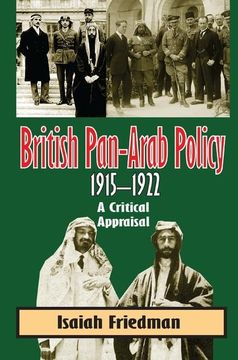Share
British Pan-Arab Policy, 1915-1922
Isaiah Friedman
(Author)
·
Routledge
· Paperback
British Pan-Arab Policy, 1915-1922 - Friedman, Isaiah
£ 39.59
£ 43.99
You save: £ 4.40
Choose the list to add your product or create one New List
✓ Product added successfully to the Wishlist.
Go to My WishlistsIt will be shipped from our warehouse between
Wednesday, June 05 and
Monday, June 10.
You will receive it anywhere in United Kingdom between 1 and 3 business days after shipment.
Synopsis "British Pan-Arab Policy, 1915-1922"
In this myth-shattering study Isaiah Friedman provides a new perspective on events in the Middle East during World War I and its aftermath. He shows that British officials in Cairo mistakenly assumed that the Arabs would rebel against Turkey and welcome the British as deliverers. Sharif (later king) Hussein did rebel, but not for nationalistic motives as is generally presented in historiography. Early in the war he simultaneously negotiated with the British and the Turks but, after discovering that the Turks intended to assassinate him, finally sided with the British. There was no Arab Revolt in the Fertile Crescent. It was mainly the soldiers of Britain, the Commonwealth, and India that overthrew the Ottoman rule, not the Arabs.Both T.E. Lawrence ("Lawrence of Arabia") and Sir Mark Sykes hoped to revive the Arab nation and build a new Middle East. They courted disappointment: the Arabs resented the encroachment of European Powers and longed for the return of the Turks. Emir Feisal too became an exponent of Pan-Arabism and a proponent of the "United Syria" scheme. It was supported by the British Military Administration who wished thereby to eliminate the French from Syria. British officers were antagonistic to Zionism as well and were responsible for the anti-Jewish riots in Jerusalem in April 1920.During the twenties, unlike the Hussein family and their allies, the peasants (fellaheen), who constituted the majority of the Arab population in Palestine, were not inimical towards the Zionists. They maintained that "progress and prosperity lie in the path of brotherhood" between Arabs and Jews and regarded Jewish immigration and settlement to be beneficial to the country. Friedman argues that, if properly handled, the Arab-Zionist conflict was not inevitable. The responsibility lay in the hands of the British administration of Palestine.
- 0% (0)
- 0% (0)
- 0% (0)
- 0% (0)
- 0% (0)
All books in our catalog are Original.
The book is written in English.
The binding of this edition is Paperback.
✓ Producto agregado correctamente al carro, Ir a Pagar.

